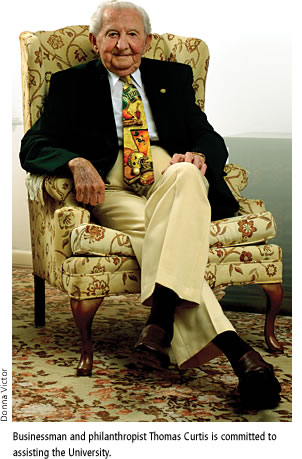 Inspiration can appear at the oddest times and in the strangest places. Like in a broiling Georgia potato field in the company of a dour, dream-killing grandfather. That’s where Thomas Alva Curtis found himself 87 years ago, plucking disgusting bugs from Irish potato plants under a brutal midday sun. But one day the potatoes, bugs, heat, and surliness coalesced into a tedium Curtis couldn’t stomach a second longer. Inspiration can appear at the oddest times and in the strangest places. Like in a broiling Georgia potato field in the company of a dour, dream-killing grandfather. That’s where Thomas Alva Curtis found himself 87 years ago, plucking disgusting bugs from Irish potato plants under a brutal midday sun. But one day the potatoes, bugs, heat, and surliness coalesced into a tedium Curtis couldn’t stomach a second longer.
“There must be a better way to make a living than this,” Curtis grumbled loudly, an unpardonable display of insolence from a Southern 6-year-old back in 1921. Prompting his grandfather to acidly retort: “Boy, you’ll never amount to a fizzle!”
Curtis still looks vaguely insulted when recounting this exchange, which transpired while Woodrow Wilson was still ensconced at 1600 Pennsylvania Avenue. “He was really serious,” Curtis says of his grandparent. “He would take his other grandchildren on horse and buggy rides to the county seat, but never me!”
Grandpa turned out to be an unwitting motivational speaker, because Curtis became a prominent Miami businessman who has donated millions of dollars to the Miller School and plans to donate more. It can safely be said that Curtis, a Florida real estate mogul and founder of the Curtis Battery & Electric company, has zoomed well beyond “fizzledom” during his 92 years.
He left his hometown of Savannah, Georgia in 1930, determined to become somebody in the midst of the Great Depression. Despite the United States’ economic doldrums, Hollywood was grinding out movies that seemed to indicate everything was honky dory in Los Angeles. So that’s where 15-year-old Tom Curtis headed, convinced an optimistic, opportunistic teenager could dodge the unemployment woes afflicting millions of adults.
He was so eager to reach Los Angeles that Curtis hitchhiked and rode railway freight cars across the continent. Sure enough, Curtis landed a position in Hollywood as a mechanic’s helper in a garage mere blocks from the Warner Brothers studio. “During the height of the Depression, they said you couldn’t buy a job,” Curtis says, still proud of his achievement 78 years later. “But I got a job.”
It was one he held for three years before wanderlust steered Curtis toward Chicago, behind the wheel of a Model A Ford Roadster that broke down in Utah’s Great Basin Desert during the trip east. Curtis strung tennis racquets at a club in suburban Chicago but found the region’s cold winters not to his liking. Miami was next on the itinerary, a move Curtis made in 1936.
A wiry young man at six-foot-two and 150 pounds, Curtis’s first Miami paycheck was earned helping burly construction workers demolish a bakery on Miami Avenue. A succession of jobs followed, including a position with a Miami battery company located at 15th Avenue and Flagler Street, Curtis says, casually tossing out the address as if he worked there yesterday.
Something else from that era stands out in Curtis’s mind—September 22, 1941. That’s the date he married Augustine Carrera, who worked in a nearby diner as a waitress. They were not wed three months before the United States entered World War II, prompting Curtis to enlist in the Navy in January 1942.
He served aboard the U.S.S. Harveson, a destroyer that escorted gasoline-laden tankers across the Atlantic Ocean on their way to Europe. Curtis watched, more than once, as German U-boats spectacularly incinerated tankers, and occasionally, an escort ship. Ever the optimist, Curtis figured that death at sea wasn’t in the cards for him. He was correct, although his destroyer was severely damaged in an accidental ramming.
After the war, Curtis migrated back to Miami, landing a job at a gas station at Seventh Avenue and Eighth Street where he rebuilt automobile batteries. It began to dawn on Curtis that instead of performing that duty for someone else, he could do it for himself. So that’s what he set out to accomplish.
“I had a friend who was in the machinery business who sold me stuff on credit and everything,” Curtis recalls of his 1946 venture. “Pretty soon I was at the point where I was making about 12 new batteries per day and 25 to 30 rebuilt ones.” New batteries, which sold for a princely $1.70, generated the most profit. So that’s where Curtis began focusing his efforts.
Curtis Battery & Electric grew spectacularly, expanding to the point where it had retail outlets in Fort Lauderdale, Hialeah, Sebring, and Puerto Rico. Curtis’s business acumen also extended to real estate dealings, such as the 296 acres he bought in the Florida Keys for $30,000 and sold to the State of Florida for $300,000.
A Miami Springs resident, Curtis has long been an active philanthropist. “I was making good money, and I figured it was time to do something to help others,” he says modestly. His generosity went up another notch following the death of his wife in 1989 from lung cancer. Augustine Curtis was a huge proponent of secondary education and of the University of Miami. So her husband has made significant gifts to UM’s Ear Institute, Cardiovascular Division, and the School of Business Administration.
“I’m going to give to the University again. It will be medical in nature,” says Curtis, who sold his battery company in 2000. “The University of Miami has a medical system that’s good for poor people and good for the rich people. It’s good for anybody,” Curtis says. “I think the University of Miami does a good job trying to help people.” |


